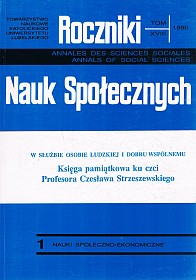Uczony i działacz
Abstrakt
The author emphasizes that Prof. Cz. Strzeszewski has significantly or even decisively contributed to the shaping of a scientific discipline which is the Catholic social teaching in Poland. Cz. Strzeszewski introduces in the Catholic social teaching a certain novelty, that is, he finds its basic principles in personalism. He draws on the philosophy of Maritain and St Thomas Aquinas. Without this philosophical-social and ethical background the Catholic social teaching would only be a set of indications issued by the Church’s hierarchy in particular social-economic and political conditions. It would cease to be a theological science but at most one of the social or political doctrines. Prof. Strzeszewski has created the Lublin School of Catholic social teaching at the Catholic University of Lublin (KUL).
In order to set up a school one needs some external conditions. They were positive and negative alike. To the positive belonged the fact that Prof. Strzeszewski had every confidence on the part of the Church hierarchy, in particular Card. S. Wyszyn´ ski’s, the Primate of Poland. The position of the Catholic university of Lublin was conducive to it. There were also unfavourable conditions and those which had ambivalent results which, in a sense, played a positive role such as: a) promoting Marxism as an official ideology of the state (the pressure of indoctrination resulted in an interest in the Catholic social teaching); b) abrogation of the Faculty of Law and Social-Economic Sciences at KUL, expulsion of many professors from the University, among whom was prof. Strzeszewski (the establishment of the so-called Section of Practical Philosophy at the Faculty of Christian Philosophy caused that the Catholic social teaching was being formed in a close contact with the philosophical milieu, searching for its bases in the philosophy of man, social philosophy and ethics).
Prof. Strzeszewski had a very clear conception of this scientific discipline. On the one hand, he was entirely faithful to the Church’s teaching, and on the other, he took advantage of theological findings, philosophy, economy, politology, and the methodology of social sciences. He consciously directed his pupils’ research to borderline areas, thus promoting the ideas of interdisciplinary or even multidisciplinary investigations. The list of disciplines to which he „delegated” his pupils and which were presented at KUL or other universities is very long. A broad spectrum of research which was at the same time being systematized have brought about good results. It suited the multidisciplinary postulate in which particular questions should be approached, and in consequence a broad and more profound way of viewing them.
„The social teaching of John Paul II is developed and made yet more profound by this direction of the Catholic social teaching which has been worked out in the Lublin School, namely, the personalistic direction”.
Prof. Strzeszewski is also a Catholic social worker. In the inter-war period he took part in Catholic organizations: „Odrodzenie” (Regeneration) and Akcja Katolicka (Catholic Action). He was a member of the Primate’s Social Council attached to Card. A. Hlond. He took part in preparing materials for Vatican Council II (mainly Gaudium et spes). After the Council he was a chairman of the national commission of the Polish Episcopate.
Copyright (c) 1990 Roczniki Nauk Społecznych

Utwór dostępny jest na licencji Creative Commons Uznanie autorstwa – Użycie niekomercyjne – Bez utworów zależnych 4.0 Międzynarodowe.


